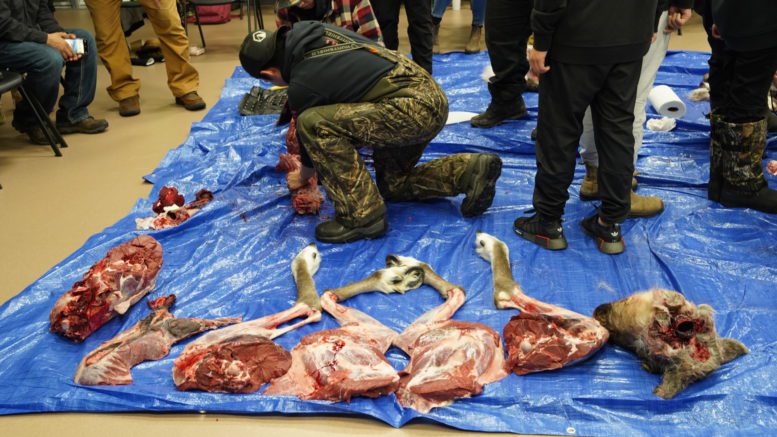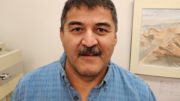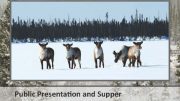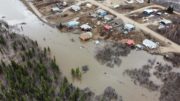Robert Alexie is retired now, but once upon a time he was a full-time harvester and a tour guide.
He believes in doing things the traditional way: Without an ATV or Ski-Doo, and without leaving any lasting marks on the land.
“Untouched,” he says. “That’s the most important word to me.”
But times, practices, and technology are changing.
Navigating these changes was one of the goals at the first-ever Teetł’it Zheh (Fort McPherson) Caribou Summit last week. The forum united harvesters from across the NWT, Yukon, and Alaska to discuss the long-term health of the Porcupine vadzaih (caribou) herd.
The three-day summit featured a briefing on the health of the herd; A “fireside chat” with Gwich’in leadership; A suite of cultural events, including traditional dance and dress showcases; and a host of other events and activities.
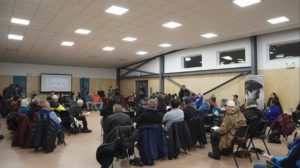
Participants attend a presentation on the first full day of the vadzaih summit on Tuesday, Jan. 17. (Ian Down/CKLB Radio)
Porcupine herd healthy, for now
The Porcupine herd, one of the largest in North America, is in good health: According to a 2017 estimate, the herd had about 218,000 members.
By comparison, other herds in the territory, like the Bathurst and Bluenose West herds, have less than 20,000 members, according to recent estimates.
“The porcupine herd is probably the one different herd that we have, almost globally at this point, for the large migratory caribou groups,” said Mike Suitor, a wildlife biologist who presented on the health of the herd at the summit.
But the herd is sensitive even to seemingly small changes in its environment: As Suitor explained, the growth of willows in the area attracts moose, which also attract wolves.
Similarly, the collapsing salmon population in the Yukon River has major implications for the health of the herd.
Youth, Elders weigh in
The summit allowed harvesters and other community members to share their wisdom and arrive at new solutions.
By the end of the forum, there was broad agreement among leaders and attendees that keeping the herd healthy is the responsibility of every hunter.
The use of four-wheel vehicles when harvesting was especially contentious.
Alana Francis is a young harvester who spoke up at the summit. “Our land is mossy, and moss takes a long time to grow back,” she said. “And so those four-wheeler tracks stay on the road for a long time. And who wants to see four-wheeler tracks all over the beautiful country that we have?”
Alexie agrees. “No more Ski-Doos, no more four-wheelers. That’s what we’ve really got to stop.”
Leadership considers new measures
Policy solutions were on the table as well.
On the last day of the summit, Gwich’in Grand Chief Ken Kyikavichik proposed lobbying for several rules, including a 7 to 14-day hunting ban at the beginning of the season when the vadzaih arrive at the Dempster Highway.
But he said leadership would need the backing of the community to make these measures work.
“If we go after it, and people complain that it’s gone too far, then we haven’t done our jobs,” he said.
Speaking after the summit, Kyikavichik said community reaction to the proposed seven to 14-day hunting ban has so far been positive.
He also agreed about the use of four-wheelers. “We will need to start working with the government to see what we can do to restrict that,” he said.
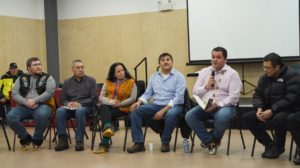
Gwich’in Grand Chief Ken Kyikavichik, second from right, speaks during a “fireside chat” with Gwich’in leadership on Thursday, Jan. 19. (Ian Down/CKLB Radio)
The onset of the Covid-19 pandemic also presented a new dilemma for harvesters and their communities: Commercial harvesting.
“Once we start getting into that territory, where we’re monetizing the Porcupine caribou herd, the vadzaih, we’re into some very dangerous territory,” said Kyikavichik.
Traditionally, the spoils of a harvest are meant to go back into the community first, especially Elders and those in need.
“Some of the harvesters were keeping the best parts for themselves and leaving some of the other parts for the Elders, and that’s not right,” said Kyikavichik. “If you’re a community harvester, the best pieces should be going to those in need, and that was a concern.”
Despite these challenges, the herd remains healthy. With any luck, community members like Alexie will be able to enjoy vadzaih for years to come. Alexie says his favourite part of the animal is “the stomach.”
“You take it out and you rub it all over that meat, especially the brisket, ribs, rump, neck. You boil it. It smells, it tastes good.”
Kyikavichik said he hopes there will be other summits in the future, perhaps bi-annually, with more attendees from all across the North.
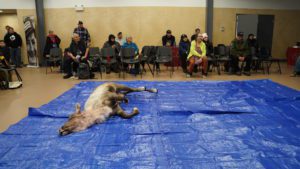
A caribou was brought in to be used for a skinning workshop. (Ian Down/CKLB Radio)

